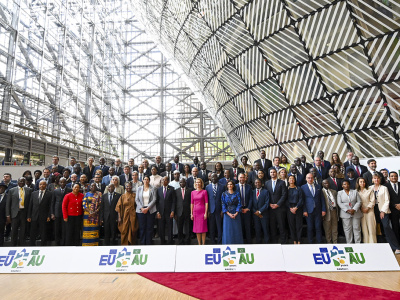
Who is who at the new African Union Commission
What's on this page
With the new African Union Commission (AUC) set to take office in a matter of days, many are curious to see how it will differ from the previous one. In this sense it crucial to looking at who the Commissioners will be. At first sight, one cannot overlook the elements of continuity with the previous AUC led by Jean Ping: Erastus Mwencha (Kenya) has been confirmed as Deputy Chairperson, and so were the Commissioners Elham Mahmoud (Egypt) in her position as for Infrastructure and Energy, Ramtane Lamamra (Algeria) for Peace and Security and Rhoda Peace Tumusiime (Uganda) for Rural Economy and Agriculture. Along with them, 4 new officials have joined the team: the AUC Chairperson, and 3 new Commissioners. Note that the post of Commissioner for Human, this Resources, Science and Technology and that of Commissioner for Economic Affairs are still vacant and will be assigned at the upcoming AU Summit in February. While it is difficult to know how the new personalities and their backgrounds might shape future activities of the AUC, this a good moment for a brief ‘who is who’. Dr Nkosazana Diamini-Zuma, from South Africa, is the first woman to lead the African Union (and its predecessor, the Organisation of African Unity, OAU). This illustrates the growing role that women have gained in African politics. She is also the first Southern African to lead the continental body, which is of more than symbolic significance for a region that is performing fairly well in terms of governance and democracy records as most of its countries are experiencing steady economic growth. She is a doctor by background and has extensive experience in foreign policy. After her first appointment as Minister of Health (1994-1999) under Nelson Mandela’s presidency, she was Minister of Foreign Affairs in Thabo Mbeki’s government, a position that she covered from 1999 to 2009. In that capacity, she was thus at the forefront during the delicate years of the transition from OAU to AU, the establishment of NEPAD and then of the African Peer Review Mechanism. Outside of Africa, she was very vocal in supporting reforms of the UN Security Council, meaning that she is not only familiar with Pan-African issues but also with international politics. From 2009 to 2012 Diamini-Zuma was South Africa’s Home Affairs Minister and embarked on a set of successful institutional reforms. How her background and previous posts may affect her agenda and her posture on the future priorities for the AUC remains to be seen. For a more detailed analysis, check how my colleague Faten Aggad assesses Diamin-Zuma’s challenges as a ‘mammoth task at hand’. Fatima Haram Acyl is the new Trade and Industry Commissioner, replacing Elisabeth Tankeu, who passed away last year. Acyl has private sector experience in auditing and finance (at Ernst & Young and the Agricultural and Commercial Bank), which is complemented with experience she gained at UNDP in her homeland, Chad. Part of the challenges of her new post is to promote coherence among existing trade initiatives of the African Regional Economic Communities. In doing so, it will be crucial to ensure that the existing patchwork of grand-sounding declarations at regional level will translate into a concrete and viable policy agenda to boost intra-Africa trade, eventually leading to a continental free trade area. Dr Aïsha Adbullahi, from Nigeria, takes over Julia Dolly Joiner’s position as Political Affairs Commissioner. She won the vote for the most popular post against 6 contenders. Adbullahi was previously Nigeria’s Ambassador to the Republic of Guinea. Before that, she was Commissioner for Special Duties in Bauchi State from May 2004 to May 2007. Abdullahi holds doctorate degree in organic chemistry from Abubakar Tafawa Balewa University. Importantly, her experience in Guinea made her acquainted with current African peace and security challenges. 'I will be proactive in conducting sound programmes that will assist the AU and its Member States to evolve, promote and nurture political governance systems (…)… I will accelerate activities that will help Member States develop unique internal democratic systems and structures' she stated upon her appointment. In the run up to the 10th anniversary of the African Peer Review Mechanism, and in the context of the implementation of the African Governance Architecture, such a stress on political governance is a promising indication for the future. Lastly, it is worth noting that she is the first Nigerian to seize a Commissioner’s seat in the AU, which makes her appointments a significant diplomatic success for her own country. Much less is known about the new Commissioner for Social Affairs, Dr Mustapha Sidiki Kaloko, a medical doctor from Sierra Leone. He replaces Advocate Bience Gawanas who completed two terms and was thus no longer eligible as candidate. We cannot but wait until 15 October for him, and his fellow new Commissioners, to unveil their programmes in detail and give a sense of the new AUC’s potential to find ‘African solutions to African problems’. -- Nicola Tissi is Research Assistant at ECDPM’s Africa’s Change Dynamics Programme. This blog post features the author’s personal views and does not represent the view of ECDPM.



